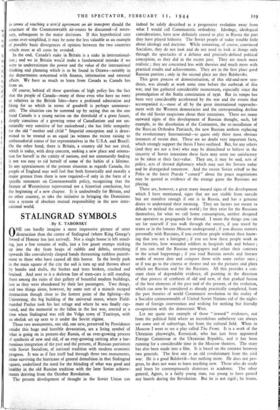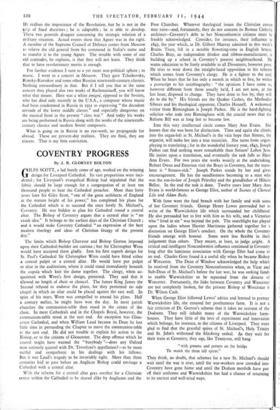STALINGRAD SYMBOLS
By E. TABORSKY
ONE can hardly imagine a more impressive picture of utter destruction than the centre of Stalingrad (where King George's Sword of Honour has just arrived). Not a single house is left stand- ing, just a- few remains of walls, just a few gaunt stumps sticking up into the sky from heaps of rubble and debris, stretching upwards like convulsively clasped hands threatening ruthless punish- ment to those who have caused all this horror. In the lovely park in the main square of the city the soil is torn up and thrown about by bombs and shells, the bushes and trees broken, crushed and bruised. And next to it a skeleton line of tram-cars is still standing there among the ruins of that gallery of beautiful modern buildings, just as .they were abandoned by their last passengers. Two things, and two things alone, however, by some sort of a miracle escaped destruction though close to the hottest point of the fighting—the Univertnag, the big building of the universal stores, where Field- marshal Paulus took his last refuge and where he was finally cap- tured, and the memorial to the fallen in the last war, erected at a time when Stalingrad was still the Volga town of Tsaritsyn, with an obelisk set up next to it under the Soviet regime.
These two monuments, one old, one new, preserved by Providence amidst this huge and horrible devastation, are a living symbol of what is going on in present-day Russia, of an ever-growing process of synthesis of new and old, of an ever-growing striving after a har- monious integration of the past and the present, of Russian patriotism with Soviet Socialism, of national tradition with modern economic progress. It was as if fate itself had through these two monuments, alone surviving the hurricane of general demolition in that Stalingrad square, underlined the need for the blending of what was good and healthy in the old Russian tradition with the later Soviet achieve- ments deriving from the October Revolution.
The present development of thought in the Soviet Union can indeed be safely described as a progressive evolution away from what I would call Communistic orthodoxy. Ideology,, ideological considerations, have now definitely ceased to play in Russia the part they have played hitherto. The Soviet people of today trouble little about ideology and doctrine. While remaining, of course, convinced Socialists, they do not look and do not need to look at things only through the spectacles of a definite and precisely-defined political conception, as they did in the recent past. They are much more realistic ; they are concerned less with theories and much more with practical results and achievements. They arc in the first place good Russian patriots ; only in the second place are they Bolsheviks.
This great process of democratisation, of this old-and-new syn- thesis, was already at work some time before the outbreak of this war, and has gathered considerable momentum, especially since the promulgation of the Stalin constitution of 1936. But its tempo has been very considerably accelerated by the war and the events that accompanied it,—most of all by the great international rapproche- ment with the Western democracies and the corresponding decline of the old Soviet suspicions about their intentions. There are many outward signs of this development of Russian thought, such, for example, as the dissolution of the Comintern, the re-installation of the Russian Orthodox Patriarch, the new Russian anthem replacing the revolutionary International—to quote only three most obvious instances of recent date. These are no doubt very important facts, which strongly support the thesis I have outlined. But, for any others (and they are not a few) who may be disinclined to believe in the sincerity of Soviet intentions these facts may seem too satisfactory to be taken at their face-value. They are, it may be said, acts of policy, acts of shrewd diplomacy which may suit the Soviets today and be disregarded tomorrow. And the recent Soviet rebuff to the Poles or the latest Pravda " canard " about the peace negotiations may be quoted as evidence of the strange game the Russians are playing.
There are, however, a great many inward signs of the development which I have mentioned, signs that are not visible from outside but are manifest enough if one is in Russia, and has a genuine desire to understand their meaning. They are factors not meant to delude or mislead the outside world ; for they exist for the Russians themselves, for what we call home consumption, neither designed nor operative as propaganda for abroad. I mean the things you can see for yourself if you walk through the streets, if you travel by trams or in the famous Moscow underground ; if you discuss matters personally with Russians, if you overhear people without their know- ing that you arc a foreigner ; if you see how these people work in the factories, how wounded soldiers in hospitals talk and behave ; if you can read the Russian newspapers and relate their contents to the actual happenings ; if you read Russian novels and literary works of recent date and compare them with some earlier ones ; or if you go to the cinema or theatre and see the pictures and plays which are Russian and for the Russians. All this provides a con- stant chain of dependable evidence, all pointing in the direction of that process of synthesis of old and new, of that gradual fusion of the best elements of the past and of the present, of the evolution, which can now be considered as already practically completed, from the past theories of world Communist revolution to the reality of a Socialist commonwealth of United Soviet Nations rid of the night- mare of foreign intervention and wishing for nothing but friendly co-operation with the democratic West.
Let me quote one example of those " inward " evidences, not from the political field where an incredulous unbeliever can always see some sort of subterfuge, but from the cultural field. When in Moscow I went to see a play called The Front. It is a work of the Ukrainian playwright, Kornejcuk, who has just been appointed Foreign Commissar oi the Ukrainian Republic, and it has been running for a considerable time in the Moscow theatres. The story has also been made into a film. It is based on the contrast between two generals. The first one is an old revolutionary from the civil war. He is a good Bolshevik—but nothing more. He does not pro- gress, he does not want to learn anything new. Those who do study and learn he contemptuously dismisses as academic. The other general, Agnev, is a fairly young man, too young to have gained any laurels during the Revolution. But he is not rigid ; he learns. He realises the importance of the Revolution, but he is not in the grip of fixed doctrines ; he is adaptable ; he is able to develop.
These two generals disagree concerning the strategic solution of a military situation. Actual events show that Agnev was in the right. A member of the Supreme Council of Defence comes from Moscow to relieve the old general from his command in Stalin's name and to transfer it to the young Agnev. The trouble with some of our old comrades, he explains, is that they will not learn. They think that to have revolutionary merits is enough.
For further evidence I turn to a yet more non-political sphere ; to music. I went to a concert in Moscow. They gave Tchaikovsky, Rimsky-Korsakov and some other Russian nineteenth-century,classics. Nothing extraordinary in that. But if I tell you that at the same concert they played also two works of Rachmaninoff, you will know what that means. Here was a white émigré, opposed to the Soviets, who has died only recently in the U.S.A., a composer whose music . had been condemned in Russia in 1931 as expressing "the decadent attitude of the lower middle classes" and especially dangerous on the musical front in the present "class war." And today his works are being performed in Russia along with the works of the nineteenth- century classics and modern Soviet composers.
What is going on in Russia is no eye-wash, no propaganda for abroad. These are present-day realities. They are final, they are sincere. That is my firm conviction.



























 Previous page
Previous page